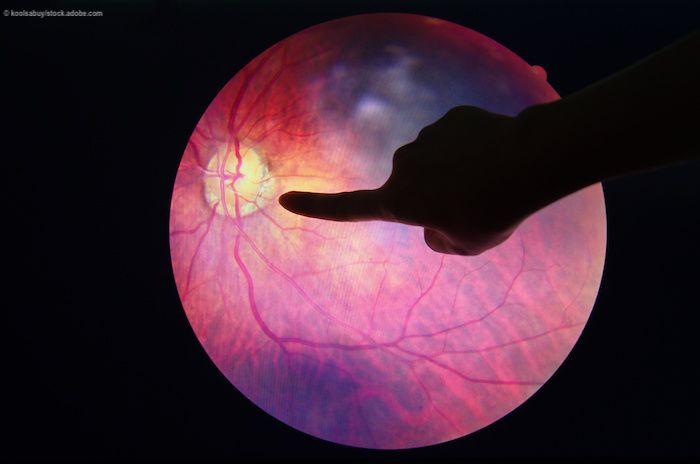Anti-VEGFs pose no additional risk of SAEs over other therapies

Anti-vascular endothelial growth factor (VEGF) therapy does not increase the risk of systemic serious adverse events in patients with diabetic macular edema (DME) compared with patients treated with macular laser photocoagulation or intravitreal corticosteroid, according to a recent real-world analysis of patients in a large U.S. insurance database.1
“It is increasingly evident that these medications are well tolerated systemically when delivered as intravitreal pharmacotherapy for sight-threatening retinal disease, including in the real-world treatment of DME,” the study authors wrote.
Maloney et al. conducted a large retrospective cohort study of more than 23,000 patients with DME spanning more than a decade and found no differences in increased risk of myocardial infarction, cerebrovascular disease (e.g., stroke, systemic embolism, transient ischemic attack), or major bleeding (gastrointestinal or intracranial bleeding, as well as bleeding from other sites) in patients treated with anti-VEGF versus those treated with steroids or laser therapy, regardless of which anti-VEGF is used.1
DME, a complication of diabetes, is a leading cause of vision loss in the United States, impacting more than 746,000 people over age 40, Maloney et al. wrote. Due to the rising rate of diabetes, the number of people with DME is expected to increase. It is estimated that 592 million people will have DME by 2035, an expected increase of 55% from 2013.2
As of 2016, more than 90% of retinal specialists in the United States treat DME patients with anti-VEGF therapy (aflibercept, ranibizumab, or off-label bevacizumab).3
The efficacy of anti-VEGF therapy for DME has been well established in multiple clinical trials, and reported systemic serious adverse events (SAEs) have been low.4,5
In fact, a meta-analysis of these studies has found them underpowered to evaluate for potentially significant differences in systemic SAEs.1 As treatment patterns in the clinic often differ substantially from those within clinical trials, this retrospective analysis of real-world patients is particularly important given the expected rise in patients who will need treatment.
RELATED: Aflibercept injection approved for diabetic retinopathyStudy results
The study cohort included patients age 18 or older who received DME treatment between Jan. 1, 2006 and Dec. 31, 2015 who were either privately insured or had Medicare Advantage.
To qualify, these treatment-naïve patients had to have a minimum of 12 months of continuous health plan enrollment before the DME. Patients were also excluded if they had a prior history of neovascular age-related macular degeneration (AMD), choroidal neovascularization, central retinal vein occlusion, or branch retinal vein occlusion.
The majority of patients were older than 55 and of black or white race. Within the study cohort, 9,219 patients were initially treated with anti-VEGF therapy, 13,365 patients with laser, and 764 patients with intravitreal steroid. Overall, patients received 24,685 anti-VEGF injections, 20,574 laser procedures, and 981 intravitreal steroid injections within 6 months of their initial treatment for DME.
Primary outcomes included the differences in rates of SAEs and all-cause hospital admission within 6 months of DME treatment. There were no differences in cerebrovascular disease (HR 0.96, p = 0.83), major bleeding (HR 1.23, p = 0.41), or myocardial infarction (HR 1.03, p = 0.88) between patients receiving anti-VEGF and patients treated with laser therapy. There was, however, a higher rate of all-cause hospital admission among patients treated with anti-VEGF compared with patients treated with laser therapy.
The most common reasons for hospitalization included diabetes-related complications, congestive heart failure, sepsis, acute renal failure, and pneumonia, among others. It is unclear if the hospitalizations are directly linked to anti-VEGF therapy or due to diabetes complications and comorbidities, and further research may be needed, the authors noted.
These findings support the systemic safety profiles of anti-VEGF agents in the treatment of AMD, whose general patient population is much older, although at lower rates of reported coronary heart disease, angina, heart attack, and stroke than their DME counterparts.1
Final thoughts
Although there are limitations to the study, among them that people with medical insurance are potentially healthier and of a higher socioeconomic status than those with public or no insurance. That could potentially mean results are not applicable to the general population.
Medications and duration of diabetes were not available for analysis, nor was mortality data.
Finally, because the authors limited the study time frame to the initial 6-month treatment regimen, any systemic SAE that develops with long-term use of anti-VEGFs could not be identified.
“Our therapeutic armamentarium for DME includes several options,” the study authors wrote.1 “Laser procedures will likely continue to play an important role moving forward, whereas advancements have been made in intraocular corticosteroid delivery systems, and promising novel local and systemic therapeutics will continue to enter the pipeline. The evolution of our DME management paradigm will hinge upon our understanding of these systemic risks."
References:
1. Maloney MH, Schilz SR, Herrin J, et al. Risk of Systemic Adverse Events Associated with Intravitreal Anti-VEGF Therapy for Diabetic Macular Edema in Routine Clinical Practice. Ophthalmology. 2019;126(7):1007-15.
2. Guariguata L, Whiting DR, Hambleton I, et al. Global estimates of diabetes prevalence for 2013 and projections for 2035. Diabetes Res Clin Pract. 2014;103(2):137-49.
3. American Society of Retina Specialists ST. ASRS 2016 Preferences and Trends Membership Survey. Chicago, IL: American Society of Retina Specialists., 2016.
4. Brown DM, Nguyen QD, Marcus DM, et al. Long-term outcomes of ranibizumab therapy for diabetic macular edema: the 36-month results from two phase III trials: RISE and RIDE. Ophthalmology. 2013;120(10):2013-22.
5. Massin P, Bandello F, Garweg JG, et al. Safety and efficacy of ranibizumab in diabetic macular edema (RESOLVE Study): a 12-month, randomized, controlled, double-masked, multicenter phase II study. Diabetes Care. 2010;33(11):2399-405.
Newsletter
Keep your retina practice on the forefront—subscribe for expert analysis and emerging trends in retinal disease management.